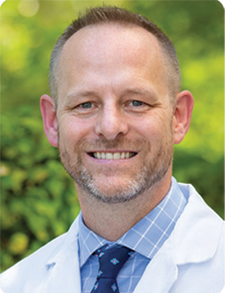 Many otolaryngologists are going back to school mid-career to pursue advanced degrees. Despite the costly and time-consuming nature of such programs, they teach topics applicable to healthcare that aren’t covered in medical school, allow surgeons to expand their knowledge base and skill sets, improve job satisfaction, and support career advancement.
Many otolaryngologists are going back to school mid-career to pursue advanced degrees. Despite the costly and time-consuming nature of such programs, they teach topics applicable to healthcare that aren’t covered in medical school, allow surgeons to expand their knowledge base and skill sets, improve job satisfaction, and support career advancement.
Explore This Issue
September 2023“At the onset of the COVID-19 pandemic, amidst chaos, high levels of stress, and uncertainty, something clicked, and I knew it was time to pull the trigger and apply for a Master of Medical Management (MMM) program,” said Julie Wei, MD, MMM, professor of otolaryngology–head neck surgery at the University of Cincinnati College of Medicine, the Dr. Alfred J. Magoline Endowed Chair in Otolaryngology, and the division director of pediatric otolaryngology at Akron Children’s Hospital in Ohio.
“No matter how difficult, I wanted to learn and gain a broader perspective about healthcare delivery in the United States and the challenges facing all physicians, hospitals, and health systems.”
Dr. Wei also decided to “take action to invest in myself and grow professionally during the onset of the pandemic, which was in part due to recognizing that my leadership journey with my last organization and health system had stalled, and I wanted even greater professional development and career growth while mitigating a high degree of burnout [from] doing the same thing over and over.”
Another reason for deciding to pursue an advanced degree is that “for any physician seeking leadership positions at executive or higher roles in an org chart or within hospital administration, the non-physician administrators and health systems appear to value and may even be biased in favor of physicians with additional degrees and credentials,” added Dr. Wei. “There are also a variety of leadership jobs outside of health systems and clinical settings for physicians, including pharma and industry, that require advanced degrees.”
Advanced Degree Programs
Along with an MMM, advanced degrees that apply to the business side of medicine include a Master of Business Administration (MBA), a Master of Health Administration (MHA), and a Master of Management in Health Care (MMHC).
Dr. Wei chose the MMM program at Carnegie Mellon University’s Heinz College of Information Systems and Public Policy in Pittsburgh, Penn., specifically because she wanted to be only among physicians, as MBA programs often include non-physicians. “Understanding the business of medicine in our current reality, where physicians have so little control over their workflow and work environment, and amidst constant change, was a priority for me.”
Robin Lindsay, MD, MBA, an associate professor of otolaryngology–head and neck surgery at Harvard Medical School in Boston, is pursuing an executive MBA at the Massachusetts Institute of Technology in Cambridge. “I elected to do an executive MBA program that isn’t healthcare focused because I wanted a broad education and to meet people with diverse educational and job backgrounds.”
For a long time, she said, “I was interested in the administrative/business side of healthcare from my time as the assistant department head when I was in the Navy. It was more of a matter of when to go back to school. I’m fortunate that I had the post-9/11 GI bill to help with the financial burden.”
According to Dr. Lindsay, while there’s very little coverage of the business of medicine in medical education, “We cannot provide high-quality care to our patients; improve access to care; recruit and retain talented nurses, faculty, and staff; and keep the lights on without understanding the financial side of care delivery.”
C. Gaelyn Garrett, MD, MMHC, the Guy M. Maness Professor and chair of laryngology and voice in the department of otolaryngology–head and neck surgery at Vanderbilt University Medical Center in Nashville, completed an MMHC at the university’s Owen Graduate School of Management in 2015. The program was developed specifically for leaders in various healthcare disciplines, including clinicians, social workers, pharmacists, administrators, and operations personnel, Dr. Garrett explained.
“Early in my career, it never occurred to me to pursue additional education, and certainly not an additional degree, until I had already assumed several leadership positions both within and outside of Vanderbilt Medical Center,” Dr. Garrett explained. One of these roles involved the Medical Economics and Outcomes Committee, which works directly with purchasing and supply chain management at Vanderbilt University Medical Center to optimize cost savings initiatives across a broad front, while also optimizing patient care for the entire institution. “I sought to play a more active role in helping direct our institution’s response to ongoing healthcare change,” she said.
Other advanced degrees include a Doctor of Philosophy (PhD) in a number of categories, a Master of Health Informatics (MHI), and a Master of Public Health (MPH), among others. Physicians may pursue an MPH to advance their research knowledge and skills in disciplines such as epidemiology and biostatistics.
Erich M. Sturgis, MD, MPH, a professor and deputy chair of the department of otolaryngology–head and neck surgery at Baylor College of Medicine in Houston, explained that his research interest was centered on cancer prevention and epidemiology. “While I had learned quite a bit on the job, I wanted formal training in the main concepts, techniques, and professional verbiage of my fields of research, and thus pursued an MPH” at The University of Texas Health Science Center in Houston.
Looking back, the group coursework expanded my network of colleagues and friends from diverse and impressive backgrounds and interests.” —Travis T. Tollefson, MD, MPH
“My early career involved clinical outcomes and animal model research, but I lacked biostatistics and epidemiologic skills,” said Travis T. Tollefson, MD, MPH, a professor in the department of otolaryngology–head and neck surgery and director of facial plastic and reconstructive surgery at UC Davis Health in Sacramento, Calif. After the first six weeks of a clinical effectiveness program at the Harvard School of Public Health in Boston, “I had exponentially expanded my grasp in clinical research and decided to pursue the full MPH degree,” he added.
Wins and Challenges
A willingness to take a reduced salary while working on career advancement was the biggest tradeoff, according to Dr. Tollefson. “Efficiency with time management is a side effect of balancing coursework, clinical workload, and academic responsibilities,” he said, noting that the “‘ah-ha’ moments in advanced degree coursework are a big dopamine burst for us all.”
Careful time management takes some extra effort and sacrifice. “Squeezing the time for classes into a busy early career academic head and neck surgeon schedule was a challenge,” Dr. Sturgis said. However, he found it easy to find projects in his clinical/research work to meet assignment needs at the school, and then turn them into peer-reviewed publications when the schoolwork was complete.
Dr. Lindsay’s executive MBA program takes, on average, 10 to 15 hours per week. “But when you’re meeting amazing new people and learning skills that directly apply to your daily life, the time is more than worth it,” she said. One particular challenge has been remembering her skills in calculus. “It had been a long time since I had thought about derivatives, but by the end, it was a good experience and proved to me that I could still figure out complex equations and learn new material. It’s an important lesson to learn about yourself as you age,” she said.
Dr. Wei experienced a learning curve over her 18-month MMM program, figuring out how to juggle working full time clinically and meeting home life and demands. “I found myself spending nearly all nights and weekends doing homework,” she said. Despite the technical challenges, such as using the online Canvas app to submit homework, attending nighttime classes, and occasionally traveling for in-person classes, Dr. Wei enjoyed the MMM program and strongly endorses professional education for physicians. “Learning from my peers who were all physician leaders was tremendously valuable,” she said, “because we all knew we wanted to influence more than we already do.”
The extra workload as a student, while maintaining a full clinical load throughout her 15-month MMHC program, was challenging for Dr. Garrett. “I did reduce some of my administrative hours to help with the heavy teamwork time required for the various projects,” she noted. “Business school was very different from medical school in that way—you were dependent on your various project teams for the success of each project. You had to adapt to the weakest link on your team to get the work done.”
Taking exams remotely on the computer from home for some classes was also a challenge for Dr. Garrett, as was essentially losing one weekend a month for the entire 15 months. The easiest aspect of the program was having colleagues who were also in the medical field who could relate, she said.
Long-Term Value
“Without a doubt, this experience did more to transform my perspectives on the operations and leadership strategies of a large healthcare institution than any other. At the time, the degree also opened doors to other opportunities, including chair openings across the country,” Dr. Garrett said. “The degree program as a whole was transformative for how I view healthcare, but also how I view economics in general, from everyday life to what’s happening nationally.”
Dr. Sturgis has continually used what he learned while completing his MPH 20 years ago and believes it was worth the extra effort to gain an advanced degree. Dr. Tollefson agrees, and said the time spent gaining his MPH was life changing. “Looking back, the group coursework expanded my network of colleagues and friends from diverse and impressive backgrounds and interests,” Dr. Tollefson said.
“Understanding health law, health policy, and so many other aspects of the practice of medicine simply decreases the limited perspective we all have no matter how hard we work,” Dr. Wei said. “I would do this over again anytime, and I now wonder when I may be able to consider another degree program such as a Master of Public Health.”
Katie Robinson is a freelance medical writer based in New York.
